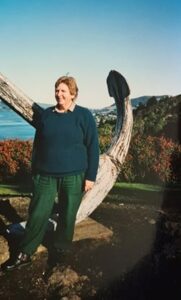Welcome to Soul Chat – Be Inspired by Thriving Women.
Meet Marjorie Theyer, an octogenarian Steiner early childhood specialist.
- Steiner playgroups follow the teachings of Rudolf Steiner. Can you tell us about this educational philosophy and how it is implemented?
This education encompasses the whole human being. The physical body, soul and spirit. Some other ways of defining it – engaging the head, heart and hand. Another way is thinking, feeling and willing (doing).
In the schooling after seven years of age education is balanced with just as much time given to movement, drama, art, music, woodwork, crafts and gardening as to the other academic subjects like English, languages, maths and the sciences. So by the time they leave school people are able to be creative, not only in their doing but also in their thinking.
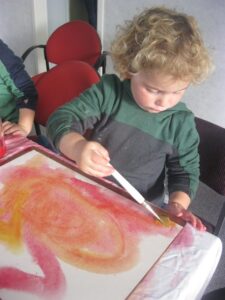
In the playgroup we foster rhythm, rhyme and repetition through singing, verses, games and stories as well as allowing the child free non-directed play both inside and outside. Gradually the child sinks into this rhythm and begins to feel safe and secure and so enjoy participating fully.
We also take great care with the child’s environment so that as they gradually ‘wake up’ to their surroundings and the senses develop in a healthy manner. So much of what is part of the very younger child’s world today does not allow for letting the senses develop well. We let the child just ‘be’ in a healthy environment created by adults with care and love.
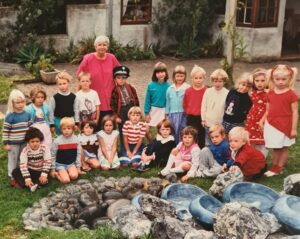
- There is a rhythm within Steiner early childhood education that is likened to the inhale and exhale of the breath. A flow that balances outward activity with the inward nurture of the senses. Please elaborate.
All our lives are based on rhythms – day/night, sleeping/waking, winter/spring/summer/autumn, the weekly/monthly/yearly/ seconds/minutes/hours etc. For the young child rhythm is security. It’s not good if she/he never knows when it’s time to eat or go to sleep.
The playgroup rhythm is simply based on long ‘out breathing’ activities (free play, morning tea) and short ‘in breathing’ activities of circle time with a few songs, action games, singing and a story with handmade puppets that celebrates the season. Children (and adults) can absorb it fully – these activities which require them to focus are only five to ten minutes of in breathing.
The rhythm needs to be regular each day and so going to playgroup is always on the same day at the same time. Our rhythm is based on breathing. We start with free play until everyone has arrived and settled and then often a morning circle with songs and verses and actions and games (not too long) for about 10-15 minutes. Everyone joins in as children learn through imitation of the adults so it’s very important the adults participate. It is also important that the adults learn the songs and stories (gradually) so that they can do them at home when their child asks them again.
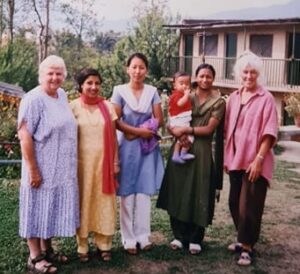
This is often followed by morning tea where children sit and eat, pass food around and some have a short grace or blessing beforehand which is normally sung. Then it’s time for an exhale with free play outside in nature perhaps with some adult help.
Some playgroups leave the story to the end and then sing a goodbye song naming all the children present.
Just as we place so much importance on keeping the same rhythm at the playgroup so also at home the child needs to have a definite rhythm of getting up, dressed, eating and again in the evening of possibly bathing, eating, storytime and bed by a certain time. Of course, as the children grow these rhythms will change as they are more capable, active and awake for longer and longer times.
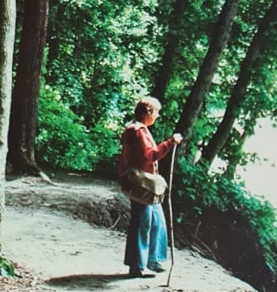
- Playgroup is not only a space for children to be nurtured but also for parents. How so?
I always say the playgroup is not really for the children (because they are too young to play cooperatively with others yet) but it is really for the sleep-deprived, homebound parents to come and talk with other like-minded adults and to swap ways of coping with the very stressful life of having young children 24-7.
The adults (and I do like to see playgroups with Dad’s present) just love coming, though most think they come as it is good for their child!
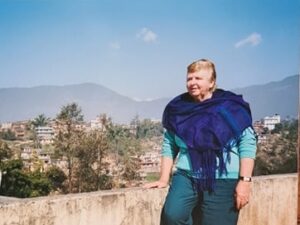
- Nature is revered in the Steiner approach. How do you honour and celebrate the environment?
Yes, we try to make the environment not only warm and welcoming but also as natural as possible both inside and outside. All resources are made from natural materials – wood, silk, wool etc. The children interact with natural materials inside and then spend much time out in nature too. Many playgroups have a sandpit, seasonal vegetable or flower garden.
In most Steiner schools here in Aotearoa there are numerous festivals and celebrations that connect with nature. Some just internally and some with the whole community. There are spring, advent, summer, harvest, easter, winter solstice and Michaelmas celebrations.
The playgroups are much more fluid and possibly only do a few but are always great community gatherings with often live music, dancing, singing, sharing food, making and creating.
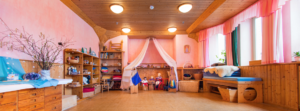
- Why is the gentle nurturing of our senses so important?
The very young child only gradually awakens to this physical world through developing their senses. Not just through hearing, sight, taste, and smell but Steiner also places great importance on touch, life (wellbeing), movement (free), warmth and balance in the fist seven years of growth. Again as a healthy foundation to build on in the following 7-14 and then 14-21 year cycles.
Today, unfortunately, every one of those senses is attacked from the movement the child leaves the womb unless the adults around him/her are careful to protect the child and to allow it to develop like a flower bud unfolds – in its own time and place. Everything nowadays bombards the young child and we expect him/her to take it all ‘in’. Actually, to answer this question properly needs a full lecture just on what is happening to all our senses now!
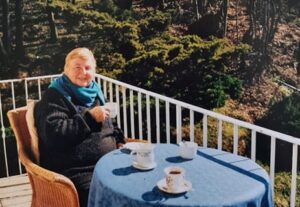
In the last 30 years there is now a huge amount of research into all of the technologies telling us what harm we are doing to ourselves and most say ‘if you can manage it, keep your children free of them until they are at least 12 years of age’.
Parents find this nigh on impossible these days, in my experience but to try and balance it by reading to the children, beginning when they are still in the womb and not stopping until they are well into their teens if possible.
Also taking them out into nature as much as possible. Go bushwalking, talking and playing with them in the glorious outdoors of New Zealand.
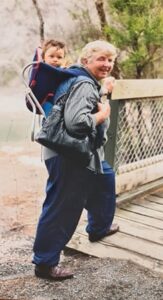
- The late Dame Whina Cooper said, “Take care of our children. Take care of what they hear, take care of what they see, take care of what they feel. For how the children grow, so will the shape of Aotearoa.” Does this wisdom resonate with you?
I personally met Dame Whena Cooper when she came to Michael Park School (a Steiner School in Auckland) to see what this type of education was about in the early 1980s. Her verdict, after scrutinizing us, was that Steiner education was the nearest she had ever come across to Maori philosophy and spirituality.
Therefore I agree wholeheartedly with Dame Whena that our future is in the way we raise our children and how we educate them. Ultimately we want our children to be able to make free, yet responsible decisions for themselves and others.
In a playgroup, this underpins everything we do. say and present. Therefore we try to create (often not easy in a much-used hall somewhere) a warm, welcoming environment with natural toys and cloths handmade where possible and with no signs of any plastic. There is also food, coffee and good conversations whilst the children play freely with everything provided to encourage the healthy development of the senses – touch, life, movement and balance.
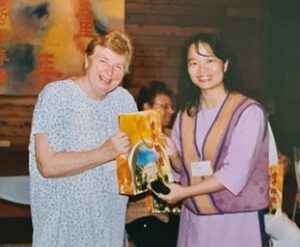
- Does your work feel purposeful to you personally and empowering of others?
I cannot speak really for ‘others’ except to say that over the years when I again meet up with people, many of them have thanked me for the insights I shared with them.
I am always amazed by this, as I often don’t even remember what I might have done or said!
However, for myself, I have found the deeper parts of Anthroposophy which underline the educational ideas and philosophy a wellspring throughout my life since I discovered Rudolf Steiner’s writings when I was around 30 years of age.

- From a holistic perspective is it believed that young children are inherently spiritual. Do you believe this and how do you see this manifesting in the young child?
Yes, they come like an open book full of love and joy and wanting to learn and be part of everyone and everything. I always say the first two or three years they are still very ‘angelic’ learning to stand, walk, talk and finally think – a wonderful progression.
To look at the world around us through a child’s eyes makes you full of wonder and amazement.

- How are you inspired by the young children you interact with?
I think they are all incredibly brave to want to be part of this world at the present time of such chaos. When I look into their eyes I see light and joy and capacity for love and doing and their faces are so open and so trusting.
I just want to make sure they are able to be given a healthy, strong foundation through free undirected play and allow their senses to develop unhampered and unhurried so they can build a good basic foundation in their first seven years for the rest of their lives and be able to fulfil what they came to do in this life.
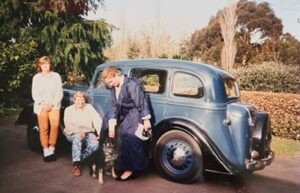
- The most fascinating places you’ve travelled and lived –
Egypt, Mexico, Nepal, China, Scotland, Antarctica & Greece.
- Favourite art –
‘The Resurrection of Christ’ painting by Matthias Grünewald from the Isenheim Altar in the 15th century, and poetry by Hone Tuwhare in the 21st century.

- A meal that comforts you –
Many! I really enjoy well-prepared, organic fresh foods of all kinds. And I do love grilled flounder occasionally!
- Someone you deeply respect –
Elisabeth Kübler-Ross, a physically tiny Swiss triplet who hit the cover of ‘Time’ magazine in 1969 for her work with near-death experiences. She visited New Zealand several times in the 1980s and gave talks to packed audiences. I heard her speak twice. She had an amazing process for helping people to die at peace. She would speak quietly, calmly and with great humility.
In one of the talks she gave her autobiography and I was totally in awe of her for that. Her ‘Wheel of Life’ book is a wonderful read. I also have great respect for her compassion, particularly for HIV sufferers and children with cancer. She was hounded in the USA for this and her home and all her medical records over the decades were burnt by arsonists.
She fought her father to become a doctor and worked nights to pay her way through studying. She married a doctor and had two children as well as devoted herself to helping humanity.
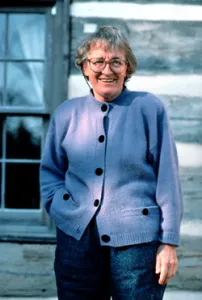
- A favourite quote –
First written by Marianne Williamson in 1989 and later attributed to Nelson Mandala when he became president of South Africa in 1994-
“Our deepest fear is not that we are inadequate.
Our deepest fear is that we are powerful beyond measure.
It is our light, not our darkness, that most frightens us.
We ask ourselves, ‘Who am I to be brilliant, gorgeous, talented, fabulous?’
Actually, who are you not to be?
You are a child of God.
Your playing small does not serve the world.
There is nothing enlightened about shrinking
so that other people won’t feel insecure around you.
We are all meant to shine, as children do.
We were born to make manifest the glory of God that is within us.
It’s not just in some of us; it’s in everyone.
And as we let our own light shine, we unconsciously give other people permission to do the same.
As we are liberated from our own fear, our presence automatically liberates others.”
